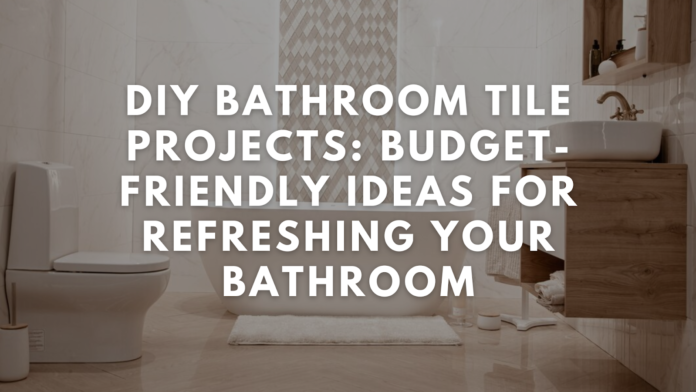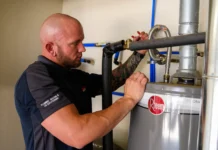Last Updated on May 26, 2025 by Nasir Hanif
Updating the look of your bathroom can feel like an expensive and daunting task, but installing new tiles is an approachable DIY project that can completely transform the space on a budget. With some thoughtful planning and preparation, you can tackle a tile refresh yourself without breaking the bank.
Table of Contents
Introduction
Installing tile in your bathroom provides a sleek, stylish look and adds value to your home. However, professional installation can be expensive, with costs ranging from $1,500 to $4,500 on average according to Modernize. The good news is that with the right guidance, DIY bathroom tile installation can help you save money while still achieving beautiful results.
This guide covers everything you need to know, from choosing affordable tiles that suit your taste and prepping your space to mastering installation techniques for walls and floors. Follow these budget-friendly tips for refreshing your bathroom tile, and you’ll gain stylish new floors and surfaces while avoiding high labor fees.
Choosing the Right Tiles
When selecting tiles, consider visiting online retailers that specialize in bathroom tiles to view a wide range of styles and prices in one place. For example, look for Bathroom Tile inspirations and cost-per-tile information to guide your planning.
With hundreds of patterns, colors, sizes, and materials to evaluate, a focused website like this allows you to efficiently research your options. Once you’ve decided on the look you love, order samples to make final choices you can confidently incorporate into your project.
In the realm of DIY bathroom tile projects, creativity knows no bounds. Beyond merely choosing tiles, infusing personality and visual appeal through creative layouts can transform your bathroom into a captivating space. Whether you opt for vibrant colors, intricate prints, mosaic designs, or innovative patterns, the possibilities are endless.
Selecting the perfect tile for your bathroom renovation is the first step toward creating your dream space. Consider the following when deciding on materials:
Research Affordable Options
Ceramic and porcelain tiles offer an attractive look at a lower price point than stone tiles. Basic white subway tiles start around $0.50 per square foot. You can also find great deals on decorative or mosaic tiles to incorporate visual interest without blowing your budget.
Consider Size and Patterns
The 2021 Houzz Bathroom Trends Study found that large-format tiles are increasing in popularity for their clean, sleek look. Fewer grout lines also make maintenance easier. For small bathrooms, opt for smaller tile sizes to make the space appear larger.
Explore Alternative Materials
Vinyl and laminate tiles stand up well to moisture while mimicking stone, ceramic, or wood visuals. With costs as low as $1 per square foot, using these alternative tile materials can lead to big savings.
Preparing Your Bathroom
Preparing your surfaces properly before installing new tiles ensures your project looks professional and lasts for years to come.
Clean and Prep Surfaces
It’s vital to thoroughly clean existing walls and floors and remove any remaining old grout or adhesives. According to This Old House, smooth, debris-free substrates allow your tiles to properly adhere.
Remove Old Tiles and Fixtures
Tackling the demolition yourself allows you to save on labor costs. According to Remodeling Magazine, the average cost to replace a tub and surround is $3,500—money that could buy a lot of beautiful new tiles!
Repair Any Damages
Address existing issues like water damage, cracks, leaks, or mold before installing new materials. DIY Network advises ensuring your substrates offer stable foundations for tile.
DIY Installation Techniques
With the right tools and techniques, you can handle tiling your walls and floors yourself.
Gather Essential Tools
As The Spruce points out, basic equipment like a snap tile cutter, tile spacers, and grout float cost less than $50 each. Invest in these vital tile installation tools as well as safety gear like gloves and knee pads.
Follow Step-by-Step Instructions
DIY Network offers detailed, beginner-friendly tutorials on using thin set mortar to securely adhere tiles to walls and floors before grouting. Their guidance allows first-timers to meet the challenge.
Employ Techniques for a Pro Look
HGTV recommends using spacers for even grout lines, gently removing excess grout with a damp sponge, and double-checking alignment as you work. Take your time with key steps for impressive results.
Creative Tile Layouts
Choosing fun colors, prints, mosaic designs, or laying your tiles in an interesting pattern adds personality and visual appeal.
Explore Layout Options
Consider herringbone arrangements, decorative borders, or geometric designs. Subway layouts give a classic look, while patterns like pinwheels or chevrons add modern flair.
Incorporate Decorative Tiles
Pep up neutral tiles with glass, metallic, or hand-painted accent tiles. Use them sparingly to trim costs, placing them inside niches, along borders, or on the floor as Area Rugs.
Place Tiles Strategically
To make a small bath appear more expansive, run floor tiles vertically up one wall or use large-scale tiles with slim grout lines. Bold patterns can lend depth when used artfully within the space.
Grouting and Sealing
Mastering the finishing steps ensures your tiles stand the test of time.
Apply Grout Correctly
Letting it sit for the directed time before wiping allows the grout to fully settle into joints. Carefully applying grout and smoothing ensures even, attractive results.
Select Grout Colors
Lighter grout keeps walls looking bright and clean. Contrasting shades add definition around each tile. Match grout to tiles for a seamless look.
Seal Tiles and Grout
Adding sealant protects porous tile and grout surfaces from stains and damage. Resealing every one to five years keeps walls and floors looking pristine with minimal maintenance needed.
Finishing Touches
Focusing on the details provides polished results and prevents issues down the road.
Install Trim Pieces
Bullnose trim along countertops prevents tile chipping if bumped. Pretty metal or tile edging offers a tidy finish where your new tiles meet existing surfaces.
Handle Tricky Cuts
Use wet saws for detailed cuts around plumbing fixtures or outlets. Nippers and files refine notches by hand. Approach intricate tile cuts patiently for best results.
Style Your Refreshed Bathroom
Update fixtures like faucets, showerheads, and light fixtures for a pulled-together look. Budget-friendly accessories like fresh towels, a rug, art, and plants complete your beautiful new space.
Frequently Asked Questions
Ceramic, porcelain, vinyl, and laminate tiles offer durable, water-resistant options at lower price points, starting at around $1 per square foot.
Properly preparing your surfaces and using quality setting materials allows DIY tile installations to last for many years with proper maintenance.
Power tools like wet saws require safety precautions. For first-timers, starting with basic hand tools for cutting and setting tiles minimizes frustration and allows you to learn techniques effectively. Advanced cuts can come later.
Conclusion
With smart planning, you can create a water-resistant, easy-clean bathroom with upgraded tilework while avoiding expensive contractor fees. Use these budget-friendly tips to tackle each step, from tile choice and layout options to preparing your bathroom and installing tiles properly. Pay attention to detail with finishing techniques like grouting and adding trim pieces for polished results.
We hope these DIY bathroom tile ideas have inspired you to refresh your space affordably. Share your beautiful results and tile tips with us below!



























